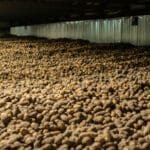The icy Canadian winter may feel long, but it’s never long enough for growers coast-to-coast to forget the worst threat that will face their crops each summer: late blight.
For Joyce and Robert Coffin, potato researchers and breeders based on Prince Edward Island, the fight against late blight is a year-round concern. “New strains of late blight are continually evolving,” says Robert. “Some of the new strains are more aggressive and can attack potatoes under dryer conditions, and some have also developed resistance to fungicides. It’s constantly changing and constantly challenging. Rick Peters [a plant pathologist at Agriculture and Agri-Food Canada based in Charlottetown] has been evaluating samples to confirm the identity of new strains.”
Robert Coffin has worked on late blight research for Cavendish Farms for years. Recently, he’s been working on potato storage projects in cooperation with other east coast researchers, hosting training initiatives for growers on minimizing rotting. This work has a direct connection with late blight, as late blight-infected tubers are highly susceptible to rotting in storage.
According to Robert, late blight is very much on the Canadian research radar. At a conference this winter, he met with several research scientists who are exploring the problem from various angles. “We’re not going to get rid of it completely but the name of the game is to stay ahead of it,” he says.
Joyce Coffin’s ongoing project at Privar Farm Inc., which she is working on in cooperation with Gefu Wang-Pruski, associate professor at Dalhousie University, is to identify markers for genes for resistance to late blight. “They do the lab work and I do the breeding,” says Joyce. “What we’re looking at is in the progeny—what percentage of the progeny actually receive the resistant genes?”
The true potato seeds produced from the crosses between resistant and susceptible lines have been delivered to Wang-Pruski’s team, which will use genetic markers to identify specific resistant genes. “Then the plantlets will be grown out and sprayed with late blight spores to see if the marker selected plants for late blight resistance actually are the only ones that show resistance when challenged with spores of late blight,” explains Joyce.
“There are a lot of things going on. It’s not simple,” she continues. “A lot of regular potatoes we grow have the resistant genes in them but for some reason they don’t get turned on. The more you dig the more you find out.”
Ultimately, the goal is to find a layered solution, says Robert. “If we did not have fungicides we could not grow potatoes. But if you can breed varieties that at least have a fairly good level of resistance, you can use fewer applications. Then you’re getting an integrated approach to managing late blight.”
“What you’ve got to hope is that you can get a plant developed with a good “immune system” so that when it’s challenged by an infection it can respond to and overcome it,” concludes Joyce.
If anybody can develop a plant like that, it’s the Coffins.










